Web of Deceit: The Bilderberg Group and Elite Powerbrokers
Linked to the UK’s Stealth Internet Censorship Coup
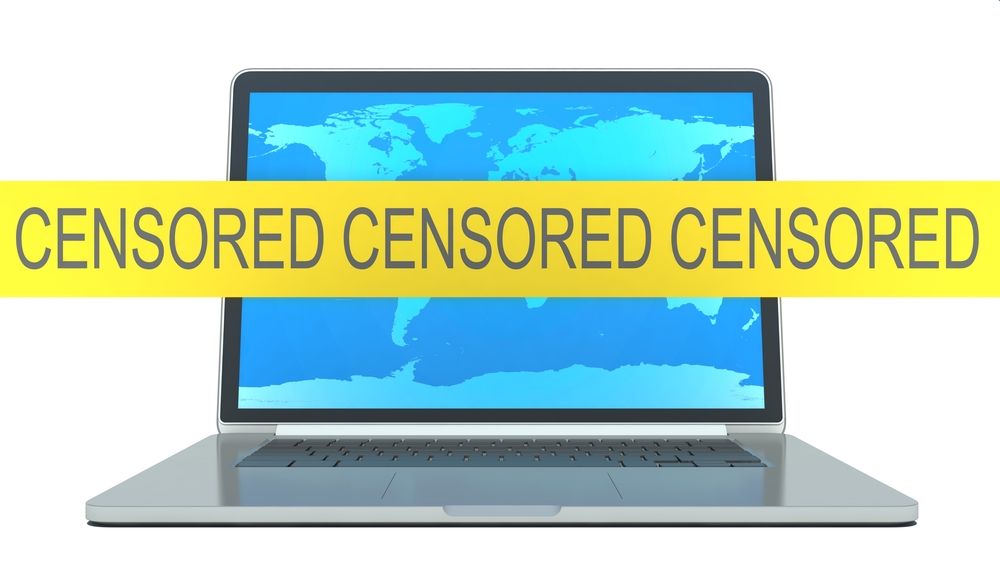
As a curtain of censorship falls over the UK internet, this special investigation uncovers the deception and elite players behind the murky system of corporate web filters, which block far more than pornography. Disturbingly, the trail points back to a notorious and controversial elite cabal – the ultra-secretive Bilderberg Group.
The UK’s sweeping internet censorship plans are ramping up, with the country’s main internet service providers (ISPs), who service 95% of UK households, rolling out ‘default’ web filters to meet the government’s call for an internet clampdown.
State-sanctioned internet filtering on this scale, often condemned when carried out by authoritarian regimes, is unparalleled in “free” western countries and sets a dangerous precedent. The way this policy has been introduced, sold and now implemented has been misleading and deceptive all along. Last year, Prime Minister David Cameron led the public to believe this is all about blocking pornography to stop the “corruption of childhood”, but it’s apparent the well-worn “think of the children” argument was just Trojan horse propaganda to create a moral pretext for introducing extensive censorship infrastructure.
While proponents point out people can still ask their ISPs to turn the filters off, the problem is the filters block more than people are led to believe and operate without transparency. They already target much more than pornography, and their reach will likely creep as time goes on. This is already happening. And who ultimately decides what these unaccountable, shadowy corporate web filters block is shrouded in mystery.

The Bilderberg Group is an ultra-secretive annual gathering of elite
global powerbrokers. Source: deesillustration.com
There was a long, well-orchestrated campaign to put these filters in place. A moral panic about online pornography was carefully manufactured to pave the way years before this occurred. I hope to unravel how this happened, and who is involved. A look at the players and history leading up to the policy announcement reveals the influence of various elite powerbrokers in government, media, international business, and religious lobby groups. Ultimately, the trail appears to point back to the ultra-secretive Bilderberg Group – a shadowy annual gathering of corporate, financial, international and government elites who meet on the sly away from the public eye, and discuss – and some would say set – global policy in complete secrecy.
I am concerned that behind these machinations is a hidden agenda that could see swathes of alternative websites blacked-out in a so-called free country, and that alternative spirituality is bound to be targeted. I am also concerned that the UK may just be the beginning. At this juncture it is important to reflect on how this policy arose, and where it is headed, to understand the serious ramifications for Britain and potentially the world. This article is a detailed investigation, so I’ve broken it up into 5 pages. I wanted to put all this information together in one post, and it turns out I dug up a lot more than I initially expected.
So to get a full picture of what is going on here, let’s take a look at how this censorship system works, then we’ll examine the elite powerbrokers pushing these plans, and the far-reaching implications of their agenda.
The Problem: Anti-Porn Catch-cry Just a Cover for a Sweeping Censorship Coup

David Cameron announcing the UK’s ISP web filter policy Source: PCmag
In July last year, UK Prime Minister David Cameron called for internet censorship in the UK under the guise of protecting children from accessing legal pornography (illegal child abuse material was already blocked). This happened after a moral panic about pornography had been running for some time, which I’ll explain further on.
After the announcement, digital rights advocate Open Rights Group warned that based on broad indications from ISPs, the filters would target multiple content categories in addition to pornography, including “esoteric material” and “web forums”. Many predicted the sweeping state-sanctioned web filters would wind up extending far beyond porn. And that’s exactly what happened. These are not merely “porn filters” despite being deceptively referred to as such.
Now operational, the filters do indeed block a murky medley of content categories. Swathes of non-pornographic websites have already been caught in the dragnet, including charities and women’s rights websites. Those who warned over-blocking would happen – either by design or by accident – have been proven right. And since the filters have been announced, the government has suggested it will now seek to block “extremist websites” and “unsavoury content” without providing any clear explanation of how these terms will be applied. The Government’s use of vague and slippery catch-all terms have many concerned the filters will inevitably be used to suppress dissent.
An Outsourced Censorship Regime
Unlike in countries like China, the UK has outsourced web censorship to the private sector, with the UK’s four main ISPs, Talk Talk, BT, Sky and Virgin all filtering their own networks.
The UK Government pressured and coerced the ISPs to install the filters and now, publicly at least, it is standing back and letting the corporations iron out the details. Could this be a shrewd attempt to introduce an unprecedented level of censorship at arm’s length while avoiding liability or accountability for its implementation and overreach?
Lack of Transparency and oversight
There is a major lack of transparency in this setup. Astonishingly, there seems to be no legal oversight or clear regulatory framework for this massive outsourced censorship system. There is no clear and unified definition of blocked content categories or explanations as to why they warrant blocking, and no easy way to find out which sites are blocked or why. There is also no clear way to discover if your website is blocked by one or more of the ISPs (especially if you’re outside the UK), nor is there a single avenue of appeal if you’re even able to find out, because each ISP operates its own inscrutable filter. This leaves the public in the dark as to what is really happening – and perhaps that’s just how the government wants it.
The opaque system is probably deliberate. Not only does it allow the Government to wash its hands and avoid being held accountable for the implementation of the creeping censorship it introduced, but it makes it possible for hidden players to influence things behind the scenes unseen, and for a range of content to be blocked without people even realising it. A system so unaccountable is ripe for misuse, abuse and overreach.
The government has faced some hiccups however. Over-blocking concerns were highlighted after charity websites were blocked. In response the Government announced that it was covertly setting up a whitelist to protect the sites deemed off-limits from the filters. But just think of the implications of this. A backroom gathering of officials has now taken upon itself, behind closed doors, to unilaterally pick out the sites out of the millions on the World Wide Web that they think should not be censored by their filtering system, which they also instated through backroom meetings. Does this mean that any sites that don’t make it on the whitelist are fair game? And if the government has taken upon itself to setup a whitelist, has it also setup a blacklist? If so, how do you find out if you are on it?
‘Active Choice’ or Censorship by Stealth?
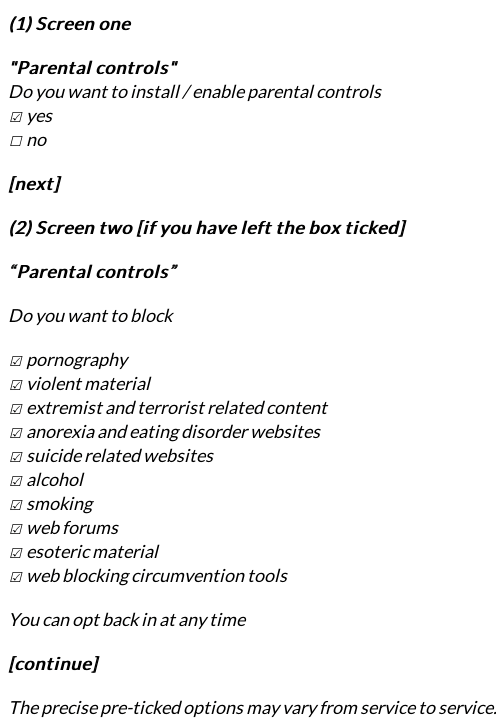
General examples of blocked content categories revealed by Open Rights
Group, which is running a campaign against UK filtering
Advocates are quick to point out people still have a choice and the filtering is not mandatory. The ISPs are pre-ticking their blocked content categories in the sign-up process for new customers. This means people can manually un-tick and “opt out” of any categories they don’t want blocked.
But given that people tend to trust default settings given by their providers, could it be people are being nudged into selecting censorship by stealth? And if people don’t know how the filters really work and what they actually block, can they really make an informed choice?
Proponents of the censorship also often completely ignore the rights of content creators in this system. People whose websites are arbitrarily blocked in the UK will have a hard time discovering it. What “active choice” do they have? How can private companies be given so much unaccountable power over what content is appropriate or not for the UK population?
How did this happen? How did this extensive and insidious stealth censorship infrastructure get rolled out while people were hoodwinked into thinking it was all about saving children from porn? To understand how, let’s take a look at the way these plans unfolded and examine the elite powerbrokers linked to these developments, including those with connections to the Bilderberg Group.
UK Censorship Policy Origins and the Bilderberg Meeting in 2006
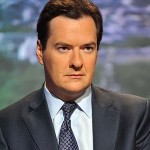
UK Chancellor George Osborne has attended Bilderberg a staggering 7
times. Source: Mirror/BBC/PA
It took years to prep the public for this state-sanctioned censorship scheme outsourced to corporations. To understand how, we have to turn back the clock to 2006. It was a pivotal year. 2006 was the year George Osborne, a super-rich aristocrat, then in opposition as the UK Conservative Party’s shadow Chancellor of the Exchequer, travelled to Canada for his first Bilderberg conference. He has been a regular attendee to Bilderberg meetings since, attending Bilderberg 2014 currently being held in Copenhagen, his seventh time at the elite secret assembly of global powerbrokers.
2006 was also the year ex-banker Claire Perry joined the Conservative Party.
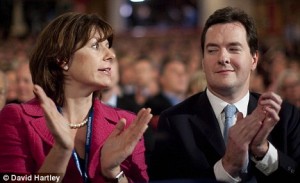
Claire Perry and George Osborne. Image: David Hartley Source: The
Daily Mail
In 2007, she became George Osborne’s “political advisor” and has been described as his protégé. In November 2009, with backing from George Osborne, the Conservative party selected Claire Perry ahead of 184 other candidates to stand for election in the safe seat of Devizes in the upcoming UK election, virtually parachuting her into a political career.
2010: New government, old agendas
It was in 2010 when the push for web censorship began in earnest. But first the groundwork had to be laid.
In the lead up to the 2010 UK election, David Cameron pledged to clamp down on the ‘inappropriate sexualisation’ of children if elected. He published a piece in the Daily Mail claiming that: “Premature sexualisation is like pollution. It’s in the air that our children breathe. All the time. Every day”. And he vowed to “make Britain a more family-friendly place to live”.
In May 2010 the Conservative Party won Government in coalition with the Liberal Democrats. David Cameron became Prime Minister while his close friend George Osborn was given charge of the economy as Chancellor of the Exchequer – generally considered the second most powerful position in government. George Osborne’s “protégé” Claire Perry came to occupy a “surprisingly large” office in Whitehall for a junior MP, sharing an office with the Chancellor’s staff.
In late May the new administration released its program for government, which included vague pledges to tackle the undefined “sexualisation of childhood”.
Soon a few religious lobby groups joined the act. In August Mother’s Union launched a campaign to “challenge the commercialisation and sexualisation of childhood” and “influence government to take action on the issue”. Then in October 2010 the religious pressure group Media March formally registered as the charity Safer Media with the specific objective to “minimise the availability of potentially harmful media content”.
Now all the pieces were in place, and the propaganda campaign began in earnest.
Claire Perry’s Blueprint to Block Porn with ISP Filters
In November 2010, Safer Media held a Parliamentary Conference titled “The Harm that Pornography Does; Its Effects on Adults and Children and the Need for Regulatory Reform”. The group’s co-founder Miranda Suit followed up with an article in the Daily Mail titled I know what internet porn does to children – and it terrifies me”.
Two days later Claire Perry called for internet censorship in a parliamentary debate. This is where the blueprint for the UK’s current network-level filtering scheme was first laid out by a member of the governing party.
Claire Perry’s calls were very specific. She made it clear ISPs should be responsible for controlling children’s access to the internet, not parents. She said ISPs should operate network-level adult content filters and that these should be switched on by default for all customers, who would have to make a conscious choice to switch them off.
“I am asking for a change in regulation that would require all UK-based internet service providers to restrict universal access to pornographic material…” Claire Perry in Parliament, 23 November 2010.
At the heart of her proposal was the view that parents are unable to take responsibility for raising their own children and are incapable of installing parental controls on their own computers, therefore state intervention was needed. She extolled TalkTalk’s plans to introduce a network filter in the new year, but chided them for making it a “voluntary system… with the onus on parents to sign up” instead of “default on” with the onus of users to turn it off.
However, Claire Perry, not being a Minister, was not stating official Government policy at the time, but just what she thought the Government’s policy should be. The Minister for Communications Ed Vaizey initially disagreed with her idea to shift responsibility from parents onto ISPs:
“I hear what my hon. Friend says about the need for ISPs to block this content, but I think it important for parents to take responsibility, and to use the filters and parental controls that are available in current technology to prevent their children from accessing harmful material.” Ed Vaizey, Minister of Communications
But he ended by saying:
“I firmly believe we can make progress, in co-operation with the ISPs, and that we can proceed on the basis of self-regulation. As I have said, I think it is important that we meet and sit around a table to exchange views, and I look forward to brokering such a meeting with my hon. Friend the Member for Devizes and a number of organisations she deems to be appropriate” [emphasis added].
Claire Perry must be very influential indeed. It’s quite interesting that within a few weeks’ time the man supposedly responsible for the UK’s communications policy would not only be toeing Claire Perry’s line after publicly disagreeing with her, but also peddling her views to the media.
Bailey Review Commissioned
Nine days after Claire Perry’s speech in parliament, Mothers’ Union CEO Reg Bailey (the first man to be appointed CEO of the organisation in its 120-year history) was appointed by Sarah Tether, Minister of State for Children and Families (and member of the Liberal Democrats), to chair an “independent review” of the “commercialisation and sexualisation of childhood”.
It was reported that some of David Cameron’s closest aides had been “determined to see a clampdown on childhood advertising” but the independent review was undertaken as a “compromise” with its coalition partners after the Conservative Party “faced opposition from some Liberal Democrats worried about censorship and freedom”.
Shock Premature Policy Announcement via Murdoch Media
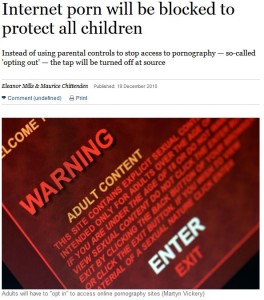 Then something unexpected
happened. Just two weeks after the announcement of an independent review that
was yet to commence or make any recommendations, Communications Minister Ed
Vaizey made a shock policy announcement via Rupert Murdoch’s paper, The Sunday Times, in an exclusive story
announcing a new government plan to have ISPs “voluntarily” implement default
network-level filtering to block porn to protect children – exactly what Claire
Perry, protégé of Bilderberg frequenter George Osborne, had called for in
parliament weeks earlier.
Then something unexpected
happened. Just two weeks after the announcement of an independent review that
was yet to commence or make any recommendations, Communications Minister Ed
Vaizey made a shock policy announcement via Rupert Murdoch’s paper, The Sunday Times, in an exclusive story
announcing a new government plan to have ISPs “voluntarily” implement default
network-level filtering to block porn to protect children – exactly what Claire
Perry, protégé of Bilderberg frequenter George Osborne, had called for in
parliament weeks earlier.Vaizey threatened to introduce legislation to force ISPs to filter if they did not “get their acts together” and do so “voluntarily”. This was the man who less than a month ago said that parents needed to take responsibility for their children’s internet use, not ISPs.
The Sunday Times broke the exclusive report in a front page story titled “Internet porn will be blocked to protect all children (pay-walled) and apart from Ed Vaizey, the story also quoted Claire Perry and Safer Media co-founder Miranda Suit. The sudden policy announcement was then extensively re-reported in other media.
TalkTalk, whose plans for network-level filtering was praised by Claire Perry in parliament – and who were caught secretly monitoring the web usage of their 4.2 million users 5 months prior – were also quoted saying: “’If other companies aren’t going to do it [install filters] of their own volition, then maybe they should be leant on.”
The Sunday Times magazine also featured the front page headline “Generation XXX – how internet porn is shaping teenagers’ *** lives”, and included an “eight-page investigation” with the feature article ***: Porn in cyberspace (pay walled: full version here) which also reported on Ed Vaizey’s announcement and quoted Claire Perry.
The use of the Murdoch media to make the surprise policy announcement, and the pre-prepared editorial focus and support from the paper for the censorship policy, suggests a highly coordinated approach between politicians and media. It should also be noted that the media mogul Rupert Murdoch is a reputed Bilderberger and has a reputation for exerting strong editorial control over the major issues covered by his papers.
The UK Internet Services Providers’ Association (ISPA UK) initially rebuffed the Government’s Murdoch media-announced plan, stating: “ISPA firmly believes that controls on children’s access to the internet should be managed by parents and carers with the tools ISPs provide, rather than being imposed top-down,” which was basically the same view Ed Vaizey had expressed just a few weeks prior.
At this point in time the public was not yet ready to accept the censorship push. But a self-reinforcing feedback loop was built up between the government and lobbyists via the media pushing this agenda, increasing pressure on ISPs to implement censorship at the State’s behest. Over time the pressure increased.
Safer Media and Claire Perry unleash a censorship campaign
In December 2010 Safer Media had an open letter published in The Sunday Times expressing support for Ed Vaizey’s initiative. Claire Perry MP was one of the signatories.
Then in early 2011 Safer Media launched a campaign, headed by Claire Perry, to block online porn. Safer Media provided a template letter for people to write to their ISPs, stating: “I strongly support the initiative, suggested by Claire Perry MP, to switch the default setting for internet pornography into our homes to ‘OFF’…”
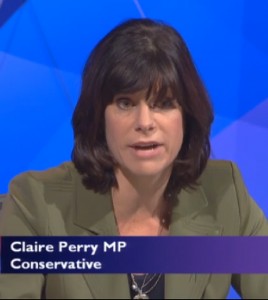
Source: marlboroughnewsonline.co.uk
By February 2011, Ed Vaizey and Claire Perry were holding a backroom meeting with ISPs to discuss internet filtering, and according to Safer Media went in “armed with over 1000 emails of support from the public.” Initially these censorship moves were supported by parent advocacy group Mumsnet, but they promptly withdrew support after their members “reacted angrily” and “criticised Mumsnet for promoting censorship and shifting responsibility away from parents”.
But Claire Perry is not one to back down when she doesn’t get her way. In March 2011, she famously stormed into the parliamentary tearoom and vented her frustration at not being given the chance to speak in the preceding parliamentary debate. “What have I got to do to be called by the Speaker? Give him a b*** j**?” she fumed. This was not the only occasion the woman who’s been dubbed Britain’s ‘new breed’ or ‘iron lady’ has shown a propensity for a potty mouth. She famously rebuffed claims internet filtering would cause over-blocking as a “load of c**k”. It’s quite ironic that the person most responsible for pushing through the UK’s censorship scheme to “protect the children”, has such little regard for the children in her choice of words as a parliamentarian and role model.
TalkTalk Launch Chinese-linked Web filter
The momentum for Perry’s censorship scheme really gained ground in May 2011 when TalkTalk launched its network-level filter Homesafe, making it the first of the UK’s four major ISPs to fall in line with Perry’s plans.
Much later it was revealed that Homesafe is operated by the Chinese firm Huawei, which is suspected of spying for the Chinese government, and that all of TalkTalk’s web traffic is routed through the company’s filter whether customers have the filters on or off. Disturbingly, the software driving Homesafe is also based on Chinese software initially developed to suppress religious minorities and political dissidents in China. More on that later.
When TalkTalk launched its filter, which was at that stage voluntary (now it is “default on”) Claire Perry welcomed the move as proof her censorship plans were technically feasible. A TalkTalk spokesperson was quoted saying Ed Vaizey and Claire Perry were “very pleased” with the filter, and claimed, “now that one ISP has come out with a solution, I’m sure others will do so too”.
Around the same time, Safer Media and Mediawatch UK ramped up their campaign to get other ISPs to follow in TalkTalk’s government-endorsed footsteps. They held a rally, with Claire Perry in attendance, and erected a “block porn” message in block letters outside British Telecom (BT) offices, one of the UK’s main internet providers.
Bailey Review Published – does not call for ISP filters
In June 2011 the Bailey Review was published. This review reinforced the government’s view of the sexualisation of childhood and was accused of positing a circular argument about this problem that was not backed by research. Nevertheless, the review was notably far more restrained in its recommendations compared to the authoritarian measures Claire Perry and Safer Media wanted.
Bailey called for ISPs to develop and provide parental controls for customers, but did not insist or recommend they be operated at the network-level by the ISPs themselves. In other words, this web control software could be supplied to parents to install and operate on their own computers if they wished to, something many ISPs already did.
Furthermore, the review did not recommend that parental control filters should be “default on”, but instead recommended parents should be given an “active choice”, where they are asked to decide whether they wanted to switch filters on or not. It also suggested these measures should be implemented voluntarily, and that the government should only consider new legislation if voluntary regulation fails. The report warned against overstating the effectiveness of filters, calling them “not completely effective”, and pointing out the need for parents to be “actively responsible” for the safety of their children on the internet.
David Cameron sent a letter to Reg Bailey supporting his report as “consistent with this government’s overall approach and my long held belief that the leading force for progress should be social responsibility, not state control.” The industry response to the review was generally positive, because it did not recommend legislation. The Internet Services Providers Association (ISPA UK) welcomed the report’s “balanced approach” and emphasis on parental responsibility alongside technological solutions, and pointed out most ISPs already offered parental control software which parents could install if they wished.
But the government’s stance would soon harden. As we’ll see, the government would soon be using authoritarian rhetoric, and winning praise from China in the process.
George Osborne Attends Bilderberg 2011 and Government Censorship Calls Harden
There was a notable hardening in the government’s rhetoric after George Osborne attended the 2011 Bilderberg Conference in St. Moritz, Switzerland.
In August 2011, ostensibly in response to the 2011 UK riots, David Cameron made a speech in parliament stating the government was working with police, intelligence services and industry to see if they could “stop people from communicating” via websites and social media when they “know” people are “plotting violence, disorder and criminality”. Concerns were raised about how the government planned to “know” what everyone was doing on the internet.
The views were warmly welcomed in China. Chinese state media praised the Prime Minister’s speech, indicating it vindicated China’s authoritarian approach to web control. China’s Global Times wrote:
“…the open discussion of containment of the Internet in Britain has given rise to a new opportunity for the whole world. Media in the US and Britain used to criticize developing countries for curbing freedom of speech. Britain’s new attitude will help appease the quarrels between East and West over the future management of the Internet.”
Claire Perry Launches her own Lobbyist-backed quasi-parliamentary Inquiry
Two weeks later, Claire Perry MP announced her own “independent parliamentary inquiry” into online child protection. The Perry Review sought to “establish the arguments for and against network level filtering” and would “recommend to Government the possible form of regulation required if ISPs fail to meet Recommendation no.5 from the Bailey Review” (Note that recommendation 5 called for active choice, not default-on network-level filtering).
You can clearly see that Claire Perry had an agenda to push. When the previous Bailey Review did not recommend what she really wanted – network-level filtering—she just launched and chaired her own lobbyist-backed quasi-parliamentary inquiry with a predetermined outcome.
The inquiry was not actually independent, as it is was sponsored by Safer Media and Premier Christian Radio, the same two groups behind the Safetynet petition demanding a default porn block which Claire Perry was backing.

Claire Perry’s independent inquiry was sponsored by two pro-censorship
lobby groups
In September 2011 Perry chaired the first public evidence session at which “witnesses” gave testimony. Meanwhile the government continued with its “active choice” policy per the Bailey Review and announced that ISPs would soon be required to have all customers make an active decision about blocking “offensive content”, as distinct from unlawful content, with parental controls.
Major ISPs Announce New Code of Practice
On 11 October 2011, the UK’s major ISPs announced a new code of practice in line with the Bailey Review, giving parents an “active choice” to install and operate parental controls. The ISPs made clear the policy did not involve automatic blocking or require them to offer network-level filtering, and actively sought to dispel rumours about this. BT, Sky and Virgin Media already offered PC-based parental control software on the network installation CD for new customers. The code simply required them to give customers an unavoidable choice about whether they wanted to install that filtering software during their setup process. Only TalkTalk was choosing to offer optional network-level filtering at this time.
In a media statement, Claire Perry called the initiative “a good first step” but said more needed to be done and the only way to “fully protect our children” was with a default filtering system. She also called on the other ISPs to offer “one-click protection” like TalkTalk.
Murdoch Media Slams the Code
On 16 October 2011 Rupert Murdoch’s The Sunday Times slammed the new code of practice with the story, “Scheme to block web porn ‘a sham’” which claimed “a leaked copy of the code” revealed the ISPs would only “offer new customers the option of installing software to control their children’s access”. However, this was no revelation – the ISPs made clear that was exactly what they were doing, and this is also exactly what the Bailey Review had called for.
Eleanor Mills wrote a column in The Sunday Times calling the new measures “A false promise over web porn that betrays our children”. She had been heavily involved in The Sunday Times’ exclusive announcement of government plans for a default network-level porn block in December 2010 – before the Bailey Review made less stringent recommendations which the ISPs were now fulfilling.
Block Porn Campaign Ramps Up
On 18 October 2011, Claire Perry chaired the second public evidence session of her “parliamentary inquiry” into online child protection. Following the session, Claire Perry stated that a report was being drafted and would be delivered to the Prime Minister. No one could have anticipated just how significant her report would be for the future of the UK internet.
On 28 October 2011, the ISP code of practice was published in full and supported in a government media statement.
Also around this time there was a public outcry over the murderer Vincent Tabak, who was sentenced to life in prison for strangling a woman who was his neighbour. It was revealed that he possessed violent *** videos of women being strangled and subscribed to hard-core internet porn (evidence for which was deemed inadmissible in court). It was suggested in the media that Mr Tabak’s pornography habits motivated the killing, but this was never proven.
Nevertheless, it reignited calls for ISPs to block legal pornography. In late October 2011 The Daily Mail reported the Church of England was considering withdrawing the millions it had invested in ISPs unless they took action to stop “the seemingly unstoppable flood of hard-core and violent pornography”. The Bishop of Bristol also called for ISPs to block content of the kind viewed by murderer Vincent Tabak and encouraged shareholders in the internet companies to pressure the ISPs to take action.
Then on 7 February 2012, Safer Media, in conjunction with Premier Christian Media, launched the SafetyNet website running the “Protecting Innocence Online” campaign, providing an online petition calling for default internet filtering. That very same day, the government released new industry guidelines and suggested it would push further than what ISPs already had agreed to in their code of practice. The statement claimed “Many parents often feel bewildered and confused about how to protect their children from the potential risks online”.
Later that month the government hosted talks with ISPs “to discuss giving parents more choice in how the internet in their home is filtered.” In a statement, Communications Minister Ed Vaizey claimed “more needs to be done”. It seems that at this point, the government was gearing up to follow Claire Perry’s line that self-installed parental controls are too difficult for parents, as a justification for intervention by the State.
Perry Publishes Lobbyist-backed Report
On 17 April 2012, Claire Perry’s parliamentary inquiry into child protection sponsored by Safer Media and Premier Christian Radio was published on her website. It called for ISPs to provide network-level filtering within 12 months and for the government to initiate a formal consultation into implementing this policy.
With some help from the media, eventually that’s exactly what happened, against the wishes of parents in the UK.
The Daily Mail wages campaign to Block Porn
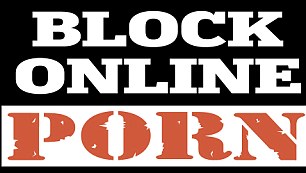
The Daily Mail’s campaign slogan
On 17 April 2012, The Daily Mail promoted Claire Perry’s report with the story, “MPs call for automatic block on all online porn to stop the surge in children watching adult material”. Following this, The Daily Mail began its “block online porn” campaign, publishing a column by Claire Perry, and a deluge of articles supporting porn blocking measures, or calling for more action while sometimes citing questionable statistics. A barrage of articles calling for a porn block would follow. A list of more than 80 articles published by the paper on this subject between April 2012 and February 2013 is available here.
The Sunday Times also continued the censorship push, publishing an open letter by Safer Media and “many Parliamentarians, academics, charities and experts” supporting Claire Perry’s recommendations. It also published pro-authoritarian columns like, “If freedom means seeing our kids defiled by porn, I opt out”.
On 26 April 2012 The Daily Mail reported that the Labour Party (the British Opposition) had thrown its support behind The Daily Mail’s campaign to block porn. The pressure to filter the internet was mounting. Claire Perry continued to keep the pressure up, and sponsored a seminar in the House of Commons where Dr William Struthers told MPs that children “are scarred for life by porn on internet.”
Government Consultations Announced – The Daily Mail Declares Victory
Claire Perry and the media soon made an impact. On 28 June 2012, the government announced public consultations where parents and businesses would be asked whether “automatic online blocks should be introduced to protect children from adult and harmful websites”. The Daily Mail was given advanced notice of this and announced the plan the day before the government did, proclaiming, “The move is a victory for the Daily Mail’s Block Online Porn campaign” and showcasing previous campaign headlines:
The trouble for Claire Perry and The Daily Mail was that the majority of parents consulted did not end up supporting default web filtering. Before the consultations were completed, the paper seemed to catch wind of this before the consultations closed. In September they reported that Ministers ‘have been sabotaging’ the battle to block porn on internet and posited the absurd premise that the consultation process was “confusing and complicated, deterring many from taking part” because it required people to follow the complicated steps of downloading a word document questionnaire, filling it out, and then re-uploading it.
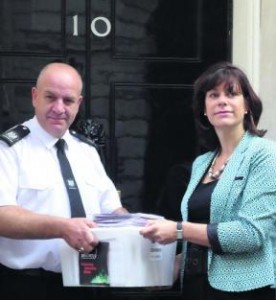
Claire Perry hands in the petition to 10 Downing Street. Source:
Wiltshire.co.uk
On 6 September 2012 the public consultations on default porn blocking come to a close, and Claire Perry said she would change her stance on default blocking if it was “not what consumers wanted”. (But when the consultation results were later released and did not support her views, this didn’t happen.)
That very same day, Claire Perry delivered the “Safety Net: Protecting Innocence Online” petition to 10 Downing Street with over 115,000 signatures. The statistics used in the petition were highly dubious, particularly the claim that “1 in 3 10 year olds have seen pornography online” which was taken from an informal anecdotal survey done at a single high school.
David Cameron Does a Deal with Huawei
That same month, David Cameron met Huawei CEO Ren Zhengfei at Downing Street, who headed the company operating TalkTalk’s network-level filter. Just few months earlier, TalkTalk had made its Huawei-operated web filter default on for all new users.
After a cosy meeting between David Cameron and Ren Zhengfei, Huawei announced plans to invest $2 billion in the UK economy and David Cameron declared the UK was “open for business” despite ongoing security concerns and warnings by a former security official he was “dealing with the devil”.
A few weeks after that, The Daily Mail reported David Cameron had new proposals to “toughen up controls on internet pornography” which “go much further than a blueprint drawn up by Reg Bailey” and were “a significant step forward for the Daily Mail’s Block Online Porn campaign.”
Consultation Released: UK Parents Resoundingly Reject Default Porn Blocks
However, the parental consultations painted a different picture – a picture the government perhaps didn’t want. On 15 December 2012, the Government quietly slipped out its report responding to the consultation on parental internet controls without even issuing a press release. The report rejected automatic porn filters after finding that parents did not want it:
“There was no great appetite among parents for the introduction of default filtering of the internet by their ISP: only 35% of the parents who responded favoured that approach”.
The Daily Mail attacks “Controversial Report”
The Daily Mail blasted the government and its “controversial report” releasing a string of critical articles from 14-16 December 2012:
- Parents ‘betrayed’ on porn as ministers reject call for opt-in for online access
- Ministers reject calls to protect children from online porn by filtering sexual content
- Children pore over sexual images as their parents watch Downton in the next room… yet ministers do nothing
- They say they are the most family friendly government ever. So why such cowardice on internet porn?
- Online porn, the fight MUST go on: Furious charities hit out after ministers refuse to order an automatic block on internet filth
The Sunday Times also joined the criticism, calling the government’s decision “incomprehensible” and made strident calls for big government authoritarian interventionism to “prevent harm”.
After just a few days of this manufactured outrage running counter to people’s wishes, it was reported that the government would ask companies providing adult content to block adult content.
Then on 19 December 2012 The Daily Mail declared victory with the story, “Victory for the Mail! Children WILL be protected from online porn after Cameron orders automatic block on sites”. The story revealed David Cameron had submitted an article to the paper (published the following day) clarifying that he had ordered a default porn block, and also reporting that he had appointed Claire Perry as his adviser on reversing the commercialisation and sexualisation of childhood. His article, Nothing matters more than keeping our children safe, praised Claire Perry and outlined what her role as an advisor would be:
“Claire is a passionate campaigner for internet safety and mother of three. Her job will be to see this through, to get internet companies on board, to do what it takes to protect children and young people online”.
The Daily Mail declares victory after
the government ignores the wishes of parents
Whatever happened to Claire Perry’s claims that she would change her position on default blocking by ISPs if people showed they did not want it – which is exactly what the consultations did show? David Cameron was criticised for doing a U-turn “after receiving a mauling in the Daily Mail” and ignoring the wishes of parents who, in the government’s own consultation, clearly showed they did not want default blocking.
And so the relentless censorship campaign continued, and a series of backroom discussions with ISPs ensued, as the government sought to get them fully on board with implementing their plan.
Later in May 2013, the government announced plans to make public WiFi more family-friendly and also released the Bailey Review Progress Report. Interestingly, the report showed that Bailey’s recommendations had been met, but until network-level filters were installed by all main ISPs, those pushing for it would not be satisfied.
But those seeking network-level censorship soon had their way after the Bilderberg meeting was held in the UK in 2013.
Bilderberg 2013 and the UK Web Censorship Announcement
From 6-9 June 2013 the Bilderberg Conference was held in Hertfordshire in the UK. Both David Cameron and George Osborne attended, as did the Labour Party’s Shadow Chancellor Ed *****, and UK taxpayers had to foot the security bill for the secret discussions they weren’t allowed to know about. David Cameron had no qualms about attending the ultra-secretive proceedings and footing the security bill with taxpayers money, despite previously promising the same taxpayers he would lead “the most open and transparent government ever“.
After this clandestine gathering, everything changed. Within a matter of weeks, an ISP filtering policy was formally announced in the UK, with backing from both major parties.
Murdoch Media Censorship Symposium at Bilderberg-linked Think-tank
Just two days after the Bilderberg conference finished, The Sunday Times held a symposium titled, “Generation XXX: Saving our children from the dangers of online pornography” chaired by the paper’s associate editor Eleanor Mills, and attended by Claire Perry MP. Was it just a coincidence the event was held at Policy Exchange, an influential Bilderberg-linked think-tank?

Claire Perry at the “Generation XXX: Saving our children from the
dangers of online pornography” symposium organised by Rupert Murdoch’s The Sunday Times and held at Policy Exchange
Policy Exchange’s links to the Bilderberg Group are no secret. A year earlier, Nick Boles MP, a founder and former director of Policy Exchange, attended the 2012 Bilderberg Conference in Virginia. According to a report by The Examiner, Nick Boles “is a member of the influential Notting Hill Set of MPs of which George Osborne is a member. He is a founder of the Policy Exchange think tank which is an important part of the Cameron government… He is a member of the Henry Jackson Society which advocates force to spread democracy.”
During the event, when critics pointed out that filters caused over-blocking due to false positives, Claire Perry rebuffed that such problems were “a load of c**k”.
Labour Party Jumps on the Bandwagon
The next day after the symposium, The Labour Party tried to pass a motion in parliament that conflated child abuse images with legal adult pornography, and claimed that 1.5 million people had viewed child abuse material (this figure has been debunked). They criticised the government for allegedly failing to meet the recommendations of the Bailey Review (though it was actually going way beyond what he recommended), and called on the government to bring forward legislation.
Two days later, Claire Perry announced that default porn filters would be rolled out by 2014 in the UK. Interestingly though, the government was yet to announce this formally. So who was really running the government’s policy?
Murdoch Media Launches “Generation Porn” Censorship Campaign
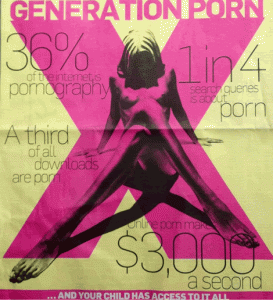
The infographic with dubious
statistics used in The Sunday Times’
“Generation Porn” campaign
Two days after that, the The Sunday Times launched its “Generation Porn” campaign and published the leader “Protect Children from the Power of Porn” and the feature article “Generation Porn” by Eleanor Mills, who had chaired the symposium at Policy Exchange. People were invited to sign-up to “Join the Sunday Times campaign to safeguard children from online pornography”.
The campaign used a striking infographic claiming: ’36% of the internet is pornography’ ‘1 in 4 search queries is about porn’ ‘A third of all downloads are porn’ ‘Online porn makes $3,000 a second’ ‘…and your child has access to it all”. All of these statistics have been shown to be highly questionable.
July 2013: UK Web Filtering Officially Announced
The next month, the government announced its now infamous web filter policy. On 21 July 2013, The Daily Mail published the article “Net porn block on EVERY home: Victory for the Mail as PM pledges ‘opt in’ rule for all web users” which announced David Cameron’s plans to have porn blocked by default to every householder in the UK unless they asked to receive it. The story quoted David Cameron saying: “The Daily Mail has campaigned hard to make internet search engine filters ‘default on’. Today they can declare that campaign a success”. The original story announced David Cameron’s policies before he had actually publicly announced them, showing a high level of coordination between Mr Cameron and the paper.
The next day David Cameron officially announced his censorship plans in a speech. In his speech, he conflated legal pornography material with illegal child abuse material (already blocked) which created the emotive impression that not supporting censorship meant supporting paedophiles. This same emotive conflation ran rife through the media’s coverage too. And the government kept pushing the line that they had to get ISPs to filter the internet because home-installed parental control software was just too baffling for most parents — when in reality, the government knew that only 7% of parents did not understand how to use such software.
The fact that illegal child abuse material was already blocked by ISPs, and the new filtering was going way beyond legal adult material was drowned out in cries to ‘protect the children’. Following the announcement, few mainstream media outlets, with some exceptions, even reported that the “porn filters” would target a swathe of material apart from porn.
From looking at the history leading up to this policy announcement, the interconnected web of elite interests becomes visible. Clearly the ex-banker Claire Perry – who came from nowhere to become the protégé of 7-time Bilderberger George Osborne and a hugely influential politician — was the main agent pushing the agenda, driving through what would become official UK policy with the support of religious charity Safer Media.
But the agenda would not have gotten very far without support from two key quarters: The media, in particular The Daily Mail, and industry, in particular Huawei who operated the first network-level filter in the UK, and proved it was technically feasible.
Next up, we’ll take a closer look at the roles they played in this scheme.
The Daily Mail – Key Player in Censorship Push
The British tabloid The Daily Mail played a crucial role in prepping the public for censorship with sensational stories pushing for default internet filters. Their influence is obvious in the way the Prime Minister chose to announce his censorship plans in the paper, and also told them to declare victory.
The Daily Mail is the second most popular newspaper in the UK, and runs the most popular online news site in the world. What you might not know is that The Daily Mail has a shadowy past steeped in fascism.
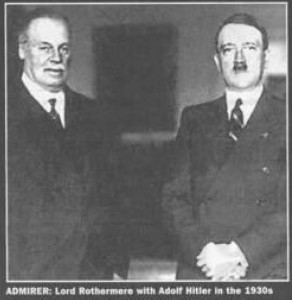
Source: The Huffington Post
It’s not a fact they like to publicise, but it’s no secret that The Daily Mail supported Hitler and the Nazis prior to World War II and promoted fascism in the UK in the 1930s.
Harold Sydney Harmsworth, 1st Viscount Rothermere, counted himself as a friend of Mussolini and Adolf Hitler when he was proprietor of The Daily Mail. Prior to World War II, he praised Hitler publicly and privately, and met him personally in Germany. Letters show that Lord Rothermere congratulated Hitler on the annexation of Czechoslovakia and encouraged him to invade Romania. He also publicly supported the British Union of Fascists, who were known as “the Blackshirts” due to their black dress code modelled on Mussolini’s paramilitary squads. In 1934 the paper ran the notorious headline, “Hurrah for the Blackshirts”
This is an example of Harold Harmsworth’s pro fascist quotes:
 “I urge all British young
men and women to study closely the progress of the Nazi regime in Germany. They
must not be misled by the misrepresentations of its opponents. The most
spiteful detractors of the Nazis are to be found in precisely the same sections
of the British public and press as are most vehement in their praises of the
Soviet regime in Russia. They have started a clamorous campaign of denunciation
against what they call “Nazi atrocities” which, as anyone who visits Germany
quickly discovers for himself, consists merely of a few isolated acts of
violence such as are inevitable among a nation half as big again as ours, but
which have been generalized, multiplied and exaggerated to give the impression
that Nazi rule is a bloodthirsty tyranny.”
“I urge all British young
men and women to study closely the progress of the Nazi regime in Germany. They
must not be misled by the misrepresentations of its opponents. The most
spiteful detractors of the Nazis are to be found in precisely the same sections
of the British public and press as are most vehement in their praises of the
Soviet regime in Russia. They have started a clamorous campaign of denunciation
against what they call “Nazi atrocities” which, as anyone who visits Germany
quickly discovers for himself, consists merely of a few isolated acts of
violence such as are inevitable among a nation half as big again as ours, but
which have been generalized, multiplied and exaggerated to give the impression
that Nazi rule is a bloodthirsty tyranny.”Today The Daily Mail is controlled by the 4th Viscount of Rothermere, the great-grandson of the 1st Viscount of Rothermere.
The Daily Mail’s Block Porn Campaign
It is quite ironic that The Daily Mail ran a strident media campaign to ban online pornography because it is hardly a pillar of decorum: it provides a notoriously gratuitous display of scantily-clad celebrity pictures on the right sidebar of its website, also known as the “sidebar of shame,” and publishes highly sexualised imagery and even nude pictures itself. It has run stories about teens in skimpy bikinis and has been accused of sexualising underage girls. Its highly sexualised content is probably the reason it toppled the New York Times as the most visited newspaper site in the world.
Thus the crusade against porn is coming from a newspaper that has been accused of peddling ‘almost porn’. Yet The Daily Mail declared ‘victory’ when David Cameron made his filtering announcement. In the self-congratulatory article, the paper boasts it “led the charge” to introduce default internet filtering. The Prime Minister also acknowledges this, and is quoted saying. “‘The Daily Mail has campaigned hard to make internet search engine filters “default on”. Today they can declare that campaign a success.”
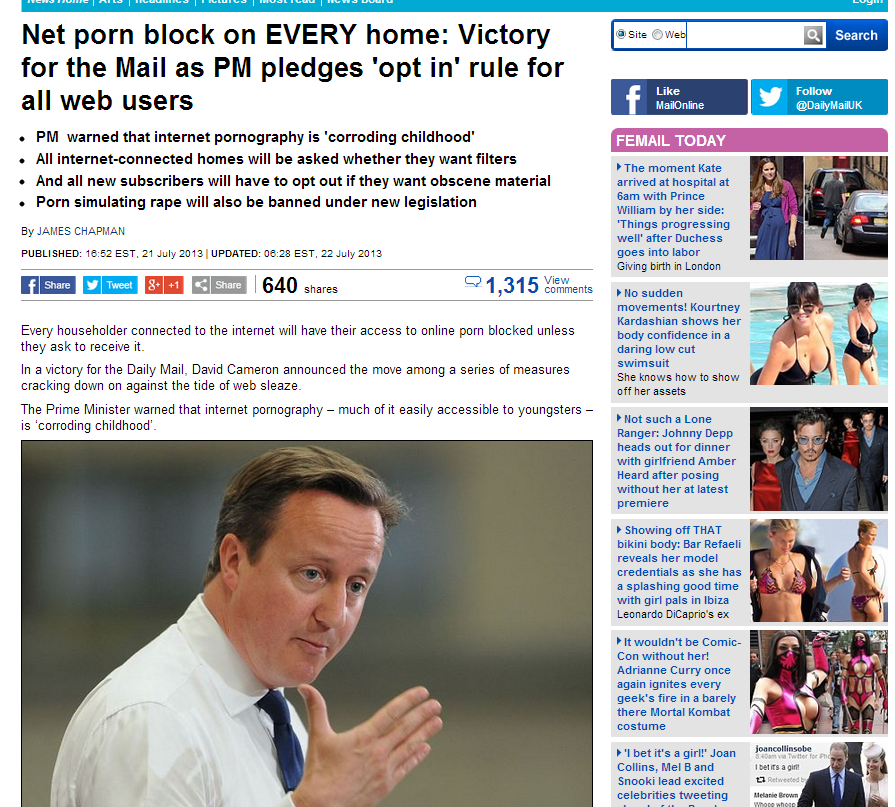
The Daily Mail’s original headline. Note the
‘sidebar of shame’ in full swing.
The caption under a picture of David Cameron reads: “Victory for the Mail: Prime Minister David Cameron, pictured today, today announced new rules requiring every internet connection to have porn blocked unless subscribers ‘opt in’ to obscene content”.
In fact, the original headline for the story was, “Net porn block on EVERY home: Victory for the Mail as PM pledges ‘opt in’ rule for all web users”. However, numerous comments on the article called out The Daily Mail’s hypocrisy due its own blatant use of sexual content. That could be why the headline was later changed to its current title, “Porn depicting rape to be BANNED in crackdown on ‘poisonous’ websites as Cameron unveils protection for every home”.
Perhaps they were trying to differentiate their own “obscene content” from the kind they were condemning, but the edited headline is very misleading because the filters block far more than porn depicting rape.
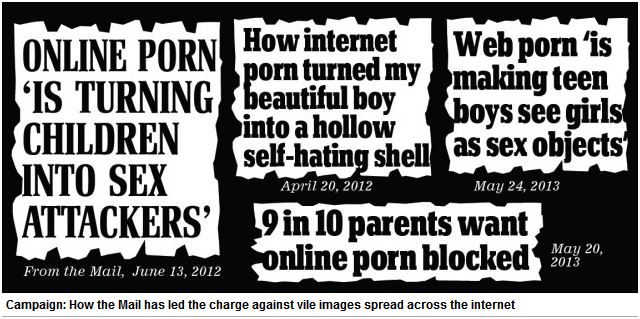 A
screen shot of an image used in The Daily
Mail’s July 2013 article announcing David Cameron’s censorship
policy
A
screen shot of an image used in The Daily
Mail’s July 2013 article announcing David Cameron’s censorship
policyThroughout its “campaign” the paper, like the government, frequently conflated illegal obscene material with legal pornography, and used the two interchangeably, which implies that opposing their campaign means you support the proliferation of the most horrendous material. And there was no mention that the filters would target much more than “obscene content” and that legal pornography is just one of many categories that will be censored by the filters. And while the paper has campaigned for censorship of legal pornography, it has shamelessly continued to proliferate voyeuristic content ogling and commenting on women’s body parts on its popular news site, and the hypocrisy of its position hasn’t escaped attention.
Double Standards
Soon after his announcement, the Prime Minister confirmed he will not back calls for Britain’s most widely read newspaper The Sun, owned by global media tycoon Rupert Murdoch, to stop featuring topless women on page 3 (the object of a current petition with over 190,000 signatures).
So what’s going on here? David Cameron works hand in glove with the media to block legal pornography online, but has no qualms if the mainstream media publish nudity on unrestricted websites and newspapers easily viewed by children. Whose interests is David Cameron serving? And does anyone seriously believe that a salacious paper like The Daily Mail that comments daily on women’s body parts is really concerned about smut? For that matter is the government genuinely concerned? A Freedom of Information request revealed that the UK’s Government Computers were Used To Access Porn More Than 300,000 Times between May 2012 and July 2013, the month David Cameron made his announcement. Then in March 2014 a close aide of David Cameron directly involved in developing the porn filter policy, resigned after being arrested over child pornography allegations.
Unsurprisingly, The Daily Mail has also been campaigning to scrap the human rights act. Given what happened in Nazi Germany in the 1930s and the paper’s previous support for Hitler and fascism, this is rather alarming. Ironically, a major driver behind the establishment of the European Convention of Human Rights was the desire to prevent something like World War II happening in Europe again. Rupert Murdoch’s The Sun has also long been pushing to scrap the Human Rights Act. This means the two most popular papers in Britain are pushing this agenda.
The Daily Mail’s pro-Nazi past is of course not proof that pro-fascism consciously pervades in its editorial stance today. But it is nevertheless alarming that a paper which supported Hitler, Mussolini and British fascism has been the biggest propagandist behind David Cameron’s big-government authoritarian moves. It is doubtful the government could have gotten this far in its plans without this media support.
The Chinese Connection: David Cameron’s Cosy Ties with Censorship Innovator Huawei
Chinese ICT giant Huawei, founded by ex-Chinese army officer Ren Zhengfei, has also played a pivotal role in these developments. This company long accused of spying for China, led the way by operating the first network-level filter in the UK, proving it was technically possible to do and giving impetus to the government’s plans. When announcing internet censorship for the UK, David Cameron praised TalkTalk for showing “great leadership” by having Huawei filter its network. When Ed Vaizey first touted a network-level filtering policy for the UK via The Sunday Times in 2010, a TalkTalk spokesperson was quoted saying, “If other companies aren’t going to do it [install filters] of their own volition, then maybe they should be leant on.”
It is not surprising that Huawei should be ahead of the game in censoring the internet, because China’s internet censorship system is regarded as the most sophisticated in the world, and it exports its technology to other authoritarian regimes.
TalkTalk, which has previously been accused of secretly monitoring its customers, began offering Huawei’s filter “Homesafe” in 2011. All of TalkTalk’s UK web traffic is routed through Homesafe and monitored by the Chinese company whether people have the filter switched on or not.
Huawei also have a close relationship with BT, another major ISP and telecommunications provider. In 2013 a Parliamentary Committee rebuked BT’s use of Huawei to build UK telecoms infrastructure as a security risk.
Both the USA and Australia have prevented Huawei from bidding for government projects due to national security fears, because the firm is considered far too close to the Chinese government. But in December 2013 the Chinese firm was granted permission (a decision David Cameron defended) to build significant portions of the UK telecoms system, despite warnings from the former Head of Cybersecurity at the UK’s Ministry of Defence, who claimed the government was “dealing with the devil”.
David Cameron has cultivated a close relationship with Huawei. The Prime Minister welcomed Ren Zhengfei to Downing Street in September 2012, when Huawei pledged to throw $2 billion at the UK. David Cameron became very cosy with Huawei from then on, and declared the UK was “open for business”.
Is it any coincidence that, within a year of that cosy meeting, David Cameron called for the UK to adopt a censorship system that bears similarity to China’s and held up Huawei’s technology as an example to follow? Is it also a coincidence that in December 2013, the UK government granted Huawei permission to build significant portions of UK telecoms infrastructure, even though, just the year prior, the Australian Government banned Huawei from bidding for its National Broadband Network roll-out due to security concerns?
Coincidence or not, it is quite fitting that David Cameron should cosy up to Huawei while pushing Chinese-style internet censorship in the UK. One of the things they like to suppress in China is freedom of religious expression. China has only five state-sanctioned religious organisations – everything else is technically illegal and the regime disparagingly labels them “sects” or “cults”, and practitioners face harassment, imprisonment and even torture. Alternative spiritual groups targeted include underground Christian churches, Tibetan Buddhists, and the Falun Gong movement. Groups like these could easily be termed “esoteric” in the UK too.
Disturbingly, Homesafe is based on Huawei’s GREENnet filter, which was partly designed to prevent access to “unhealthy websites” in China which apparently includes those of “malicious religious groups”– according to an archive of Huawei’s GREENnet promotional literature, taken from a previous page they have since taken down.
Does David Cameron want to sneak through a clandestine Chinese-style clampdown on spirituality and political dissent in the UK? Whatever the case, it is highly alarming that David Cameron holds up technology designed to suppress dissent and religious minorities in an authoritarian country as a blue print for the UK to follow.
The situation is even more alarming when you consider the insidious ways alternative spirituality is already being targeted by other means in the UK. A look at further machinations underway reveals a stark situation.
Online Inquisition: Alternative Spirituality and Beliefs Already Targeted on Mobile Phone Networks and WiFi
A look at the levels of internet censorship already enforced by mobile phone and public WiFi providers suggests a worrying trend, with “alternative beliefs” and “esoteric” content in the firing line.
Mobile phone operator Orange Phones in the UK has already blocked websites of so-called “universally acknowledged sects” that promote “esoteric practices”. The “universal” source classifying “sects” or “esoteric practices” is not specified, nor is their justification for even blocking such content in the first place. Like many things about censorship in the UK, the rationale and agents driving these moves are shrouded in mystery. (Although it should be noted that Orange is French company, and France has particularly draconian laws against free religious expression, which might have something to do with it.)
The government has also been in close consultations with the UK’s main public WiFi providers (Arqiva, BT, Nomad, Sky, Virgin and O2) to make their filters “family friendly”. Similar to the case with ISP filters, the government talks about blocking pornography, but the filters block a whole lot more.
People have been denied access to websites labelled “alternative belief/spirituality” in public WiFi hotspots in the UK. A petition organiser against the UK’s ISP censorship policy reported having his reiki website blocked in a public café for instance.
This was not an isolated incident. A recent report by Adaptive mobile revealed that the blocking of spiritually-themed websites is widespread on UK WiFi – a staggering 44% of UK WiFi hotspots block religious sites.
Whether you call it religious, spiritual, esoteric or alternative beliefs, clearly there is an effort to target this kind of information. The esoteric label could be applied to anything providing alternative information that doesn’t fit with the secretive and powerful elite who don’t want people thinking too much outside the square – or challenging them. And those blacklisted face the double-whammy of appearing “guilty by association” by being filtered alongside dangerous, offensive and illegal content, along with being blocked into oblivion.
Might this filtering be part a wider agenda to steadily and surreptitiously erode the free expression of alternative spirituality?
A Multi-pronged Plan to Silence Dissent?
There seems to be another prong to this attack. While implementing censorship, the government is also flagging changes to laws that will disempower those likely to be targeted by their sweeping censorship.
Considering there have already been reports of internet filters blocking charities, it is rather concerning that the government has been pushing the charity-targeting “gagging bill”, which it finally passed in January 2014. The gagging bill restricts free speech and protest by preventing protest groups or charities from challenging the government policy in the lead up to elections by clamping spending caps on organised forms of dissent. Now that this law is passed, the government can limit any organised protest against the censorship system it implemented, when David Cameron and his government seek re-election in 2015. And this is significant when you consider what else is at stake in the next UK general election.
The government has also announced that, should it be re-elected, it will scrap the Human Rights Act, a bill which gives further legal effect to the European Convention on Human Rights (ECHR), a civil liberties charter signed by Britain and other European countries in the aftermath of World War II.
Under the UK Human Rights Act (the Act), the UK Government is broadly prohibited from violating the civil liberties of its people defined in the ECHR, and citizens can seek legal recourse within UK courts if their individual rights are violated by the government. This means that civil rights enshrined in the ECHR have legal enforcement in the UK, giving it much more strength than a mere Declaration of Human Rights.
One of the civil liberties protected by the Act includes the freedom of conscience and belief, which includes the “freedom to manifest one’s religion or beliefs”. That freedom includes not just the right to practice one’s beliefs privately, but to express it openly – something censorship would obstruct. So for example, an employee of British Airways was able to go the ECHR when the company tried to ban her from wearing a crucifix, and her religious freedom was upheld.
Freedom of expression in general is also protected, as is the right to privacy, which may be in conflict with the government’s mass surveillance, which is the subject of current legal action. So in principle, the Act gives people a way to challenge the government if their rights are being limited by government-mandated internet filters.
For the time being, the government’s strategy to avoid such a legal challenge has been to muddy the waters by pressuring private companies to introduce censorship “voluntarily”, rather than requiring them to do it through legislation, making it ambiguous as to what extent the government holds responsibility. Ultimately, however, the government plans to scrap the human rights act altogether and has also hinted at withdrawing from the ECHR completely, which would remove all possibility of a legal challenge by this avenue.
Although there has been talk of replacing the ECHR with a British Bill of Rights, this may be the carrot that leads the donkey. Any Bill the UK creates to replace the ECHR charter with is likely to be watered down or more restrictive with the effect of providing people less rights, not more. Otherwise, why even bother with the replacement?
Another strategy the government has is to conflate the ECHR with the EU, when the two are not connected. There is significant resentment to the EU in Britain. The EU is often criticised for making decisions that suit the elite but not the ordinary people, but the government is fully committed to staying part of it. So its strategy is to redirect that resentment toward ECHR and use it a scapegoat, so it can remain in the elite-centric EU while attacking a separate body more geared towards giving ordinary people a means to appeal decisions made by the elite in governments and corporations.
By scrapping the Human Rights Act, the UK government will be able to curb their own courts from upholding human rights. Severing ties with the ECHR will then cut off UK citizens’ last line of appeal. So if a company tries to ban you from wearing a crucifix to work or blocks your spiritual website, who will you appeal to?
False Flag Fanaticism: MI5 Terror Asset used to Justify Clampdown on Human Rights
Just as the UK’s sweeping censorship uses a false premise of “protecting the children” to justify trampling on the rights of everyone, the attack on human rights in the UK is supposedly being done on the premise of making it easier for the government to deport alleged terrorists. The government wants the public to believe it is necessary to remove everyone’s human rights, because it faced delays in deporting certain individuals linked to terrorism that it could have prosecuted instead under British criminal law – but chose not to for political reasons.
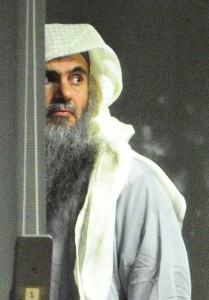
MI5 Asset Abu Qatada. Source: UK Home
Office
The long drawn-out and expensive delays in deporting Abu Qatada have been used by the government and certain media outlets to stoke public antagonism towards the Human Rights Act, such that people have come to see human rights as a threat to their security, rather than something that protects everyone. This has generated support for government plans to not only scrap the act but withdraw from the ECHR.
The government would have known it would face delays under its human rights obligations by attempting to deport an untried and unconvicted individual to a country where he may be tortured. If the government really considered Abu Qatada to be a dangerous criminal, why not just put him on trial in the UK instead of going through the lengthy expensive deportation route?
The real reason might be that Abu Qatada was an MI5 double agent. When he was wanted by the UK’s allies early last decade, Time Magazine reported he was being kept, “tucked away in a safe house in the north of England… fed and clothed by British intelligence services,” while the UK authorities apparently pretended they did not know where he was. In all probability, the real reason he was not put on trial was that it would put his relationship to security services under the microscope. MI5 probably did not want a court scrutinising their close connections with an individual who the government claimed to be a threat to national security.
Has this whole situation been engineered as a PR exercise to push public sentiment in favour of scrapping human rights by stoking terrorism fears, using MI5 asset Abu Qatada as a scapegoat? Whatever the case, it looks fishy, and the government’s plans to gag debate prior to the next election and remove legal avenues to challenge censorship once re-elected should ring alarm bells.
Persecution of Alternative Spirituality and Esotericism through History
As we try to fathom the UK’s insidious push to target alternative spirituality by a range of means, it is worth remembering there is a historical context to this. The suppression of “esoteric” information is nothing new.
Throughout time there have been attempts to suppress the free flow of esoteric knowledge, which has the potential to empower the individual. Sometimes this has been done by dominant religious institutions, as with the brutal oppression of the Inquisition for example, or by irreligious forces opposed to spirituality, as in the religious purges of the Soviet Union. Esoteric knowledge is powerful as it allows people to wake up and question their reality, and such people cannot easily be manipulated by the powers that be. As in the past, today there are those who wish to suppress esoteric knowledge – the hidden mystical side of spirituality – as well as erode the place of public religious teachings of mainstream religion. Today these efforts are more subtle and clandestine. Slipping esoteric material categories into internet filters is a way to suppress information covertly, without people realising what they are not seeing.
This is what makes ISP level default filtering of the internet in the UK so alarming, because these filters will reach the majority of UK households and will be centralised and controlled by a few corporations behind a veil of unaccountable obscurity. The categories they block are broad, and no one really knows who is ultimately responsible for what they target. Since most people stick with default internet settings, their reach and effects could be insidious.
This situation has very serious ramifications for the free flow of alternative viewpoints, whether spiritual, political, or otherwise, which could fall into vague categories like “esoteric material” or even recently touted “extremist websites”.
An Unfolding Agenda
It is obvious that the moral cause of protecting children has been hijacked as a Trojan horse cover story to ram through a sweeping censorship regime that will ultimately restrict the internet for the majority of the UK population.
Censorship has been foisted on the UK under a diversionary pretext, led by Claire Perry, the protégé of a 7-time Bilderberg attendee, George Osborne, a close friend to Prime Minister David Cameron. Now, it seems the government is clamping down organised dissent and is seeking to entrench its censorship agenda by stoking terrorism fears to legitimise removing legal avenues to challenge these policies after the next election in 2015.
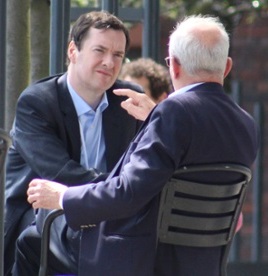
George Osborne quietly receives an intense briefing at Bilderberg 2014 from
Bilderberg upper echelon Sir John Kerr. Picture: Hannah Borno. Source: The
Guardian
Both major parties in the UK have close ties to the Bilderberg group. Could that be why these authoritarian censorship machinations have bipartisan support? Is the UK just the first western country where these murky censorship clampdown measures will be rolled out? Is it just a coincidence that UK-style measures have since been broached in other Western nations such as Australia and Canada?
When you look at the interconnected web of elite interests involved in this scheme – encompassing the Bilderberg group, the UK government, major political parties, religious lobbyists, a firm linked to the Chinese government extending influence into the UK telecoms sector, the touting of technology developed to suppress dissent and alternative beliefs as a blueprint for the UK – and when you factor in the stealthy and deceptive way alternative beliefs are targeted under the banner of making the internet “family friendly,” the situation appears grim.
Most people would agree children should be protected from internet pornography and violent material. I don’t want to gloss over the damaging effects pornography can have and the benefits of shielding children from mass exposure to it. But that can be done with through proper supervision in conjunction with transparently operated filters installed in the home, chosen and operated by parents and carers, rather than shadowy, creeping centralised censorship systems operated by corporations without scrutiny. Parenting is the responsibility of parents and carers, not of the State or corporations.
The internet has the unique capacity to empower individuals to access and share important information the mass media does not cover. It sets a dangerous precedent if the internet in “free” countries is hijacked via censorship to be rigged in favour of corporations, government and dominant institutions, while those offering an alternative voice are blocked out. There are sinister forces who would like to suppress the knowledge about how to free our consciousness from manipulation. If “esoteric” and “alternative belief” websites are blocked, then anything that questions, challenges or provides an alternative view of the dominant power structures of society could be targeted and marginalised.
As the Bilderberg group wind up their meeting behind a cloak of secrecy in Copenhagen, and with the UK’s next election looming in 2015, we need to watch this space. The politicians must know that the public is alert to this agenda and sees through the deception. Those who care for truth and freedom should remain vigilant and ensure that people’s rights and freedoms are not silently stripped away.
From Conscious Reporter @ http://consciousreporter.com/conspiracy-against-consciousness/web-of-deceit-the-bilderberg-group-and-elite-powerbrokers-linked-to-the-uks-stealth-internet-censorship-coup/?singlepage=1
For more information about censorship see http://nexusilluminati.blogspot.com/search/label/censorship
- Scroll down through ‘Older Posts’ at the end of each section
Hope you like this
not for profit site -
It takes hours of work every day by
a genuinely incapacitated invalid to maintain, write, edit, research,
illustrate and publish this website from a tiny cabin in a remote forest
Like what we do? Please give anything
you can -
Contribute any amount and receive at
least one New Illuminati eBook!
(You can use a card
securely if you don’t use Paypal)
Please click below -
Videos - https://www.youtube.com/watch?feature=player_embedded&v=IUZh60jgId0
https://www.youtube.com/watch?feature=player_embedded&v=h1b96DNxxg8
For further enlightening
information enter a word or phrase into the random synchronistic search box @
the top left of http://nexusilluminati.blogspot.com
And see
New Illuminati – http://nexusilluminati.blogspot.com
New Illuminati on Facebook - https://www.facebook.com/the.new.illuminati
New Illuminati Youtube Channel - http://www.youtube.com/user/newilluminati/feed
New Illuminati on Google+ @ https://plus.google.com/115562482213600937809/posts
New Illuminati on Twitter @ www.twitter.com/new_illuminati
New Illuminations –Art(icles) by
R. Ayana @ http://newilluminations.blogspot.com
The Her(m)etic Hermit - http://hermetic.blog.com
The Prince of Centraxis - http://centraxis.blogspot.com (Be
Aware! This link leads to implicate & xplicit concepts & images!)
DISGRUNTLED SITE ADMINS PLEASE NOTE –
We provide a live link to your original material on your site (and
links via social networking services) - which raises your ranking on search
engines and helps spread your info further! This site is
published under Creative Commons Fair Use Copyright (unless an individual
article or other item is declared otherwise by the copyright holder). Reproduction
for non-profit use is permitted & encouraged, - if you give attribution to the work &
author. Please include a (preferably active) link to the original (along with
this or a similar notice).
Feel free to make non-commercial hard (printed) or software copies or
mirror sites - you never know how long something will stay glued to the web –
but remember attribution!
If you like what you see, please send a donation (no amount is too
small or too large) or leave a comment – and thanks for reading this far…
Live long and prosper! Together we can create the best of all possible
worlds…
From the New Illuminati – http://nexusilluminati.blogspot.com
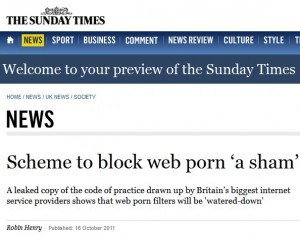

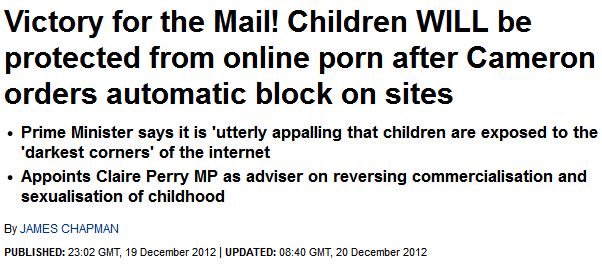

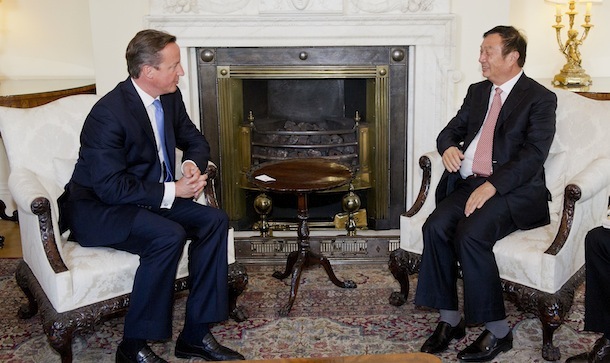
Many predicted the sweeping state-sanctioned web filters would wind up extending far beyond porn. And that’s exactly what happened.
ReplyDeletevumoo